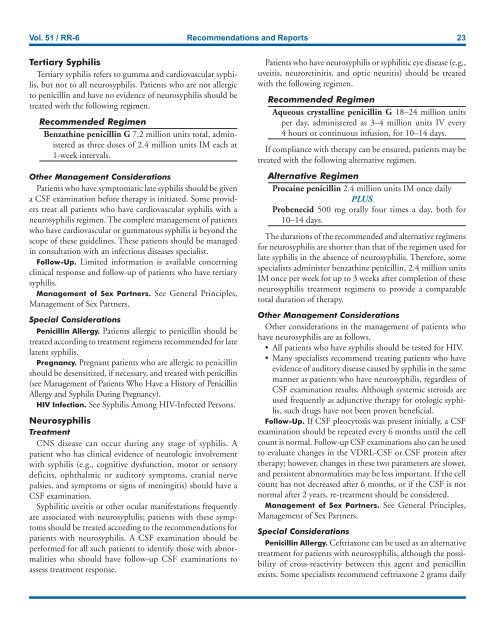You also want an ePaper? Increase the reach of your titles
YUMPU automatically turns print PDFs into web optimized ePapers that Google loves.
Vol. 51 / RR-6 Recommendations and Reports 23<br />
Tertiary Syphilis<br />
Tertiary syphilis refers to gumma and cardiovascular syphilis,<br />
but not to all neurosyphilis. Patients who are not allergic<br />
to penicillin and have no evidence of neurosyphilis should be<br />
treated with the following regimen.<br />
Recommended Regimen<br />
Benzathine penicillin G 7.2 million units total, administered<br />
as three doses of 2.4 million units IM each at<br />
1-week intervals.<br />
Other Management Considerations<br />
Patients who have symptomatic late syphilis should be given<br />
a CSF examination before therapy is initiated. Some providers<br />
treat all patients who have cardiovascular syphilis with a<br />
neurosyphilis regimen. The complete management of patients<br />
who have cardiovascular or gummatous syphilis is beyond the<br />
scope of these guidelines. These patients should be managed<br />
in consultation with an infectious diseases specialist.<br />
Follow-Up. Limited information is available concerning<br />
clinical response and follow-up of patients who have tertiary<br />
syphilis.<br />
Management of Sex Partners. See General Principles,<br />
Management of Sex Partners.<br />
Special Considerations<br />
Penicillin Allergy. Patients allergic to penicillin should be<br />
treated according to treatment regimens recommended for late<br />
latent syphilis.<br />
Pregnancy. Pregnant patients who are allergic to penicillin<br />
should be desensitized, if necessary, and treated with penicillin<br />
(see Management of Patients Who Have a History of Penicillin<br />
Allergy and Syphilis During Pregnancy).<br />
HIV Infection. See Syphilis Among HIV-Infected Persons.<br />
Neurosyphilis<br />
Treatment<br />
CNS disease can occur during any stage of syphilis. A<br />
patient who has clinical evidence of neurologic involvement<br />
with syphilis (e.g., cognitive dysfunction, motor or sensory<br />
deficits, ophthalmic or auditory symptoms, cranial nerve<br />
palsies, and symptoms or signs of meningitis) should have a<br />
CSF examination.<br />
Syphilitic uveitis or other ocular manifestations frequently<br />
are associated with neurosyphilis; patients with these symptoms<br />
should be treated according to the recommendations for<br />
patients with neurosyphilis. A CSF examination should be<br />
performed for all such patients to identify those with abnormalities<br />
who should have follow-up CSF examinations to<br />
assess treatment response.<br />
Patients who have neurosyphilis or syphilitic eye disease (e.g.,<br />
uveitis, neuroretinitis, and optic neuritis) should be treated<br />
with the following regimen.<br />
Recommended Regimen<br />
Aqueous crystalline penicillin G 18–24 million units<br />
per day, administered as 3–4 million units IV every<br />
4 hours or continuous infusion, for 10–14 days.<br />
If compliance with therapy can be ensured, patients may be<br />
treated with the following alternative regimen.<br />
Alternative Regimen<br />
Procaine penicillin 2.4 million units IM once daily<br />
PLUS<br />
Probenecid 500 mg orally four times a day, both for<br />
10–14 days.<br />
The durations of the recommended and alternative regimens<br />
for neurosyphilis are shorter than that of the regimen used for<br />
late syphilis in the absence of neurosyphilis. Therefore, some<br />
specialists administer benzathine penicillin, 2.4 million units<br />
IM once per week for up to 3 weeks after completion of these<br />
neurosyphilis treatment regimens to provide a comparable<br />
total duration of therapy.<br />
Other Management Considerations<br />
Other considerations in the management of patients who<br />
have neurosyphilis are as follows.<br />
All patients who have syphilis should be tested for HIV.<br />
Many specialists recommend treating patients who have<br />
evidence of auditory disease caused by syphilis in the same<br />
manner as patients who have neurosyphilis, regardless of<br />
CSF examination results. Although systemic steroids are<br />
used frequently as adjunctive therapy for otologic syphilis,<br />
such drugs have not been proven beneficial.<br />
Follow-Up. If CSF pleocytosis was present initially, a CSF<br />
examination should be repeated every 6 months until the cell<br />
count is normal. Follow-up CSF examinations also can be used<br />
to evaluate changes in the VDRL-CSF or CSF protein after<br />
therapy; however, changes in these two parameters are slower,<br />
and persistent abnormalities may be less important. If the cell<br />
count has not decreased after 6 months, or if the CSF is not<br />
normal after 2 years, re-treatment should be considered.<br />
Management of Sex Partners. See General Principles,<br />
Management of Sex Partners.<br />
Special Considerations<br />
Penicillin Allergy. Ceftriaxone can be used as an alternative<br />
treatment for patients with neurosyphilis, although the possibility<br />
of cross-reactivity between this agent and penicillin<br />
exists. Some specialists recommend ceftriaxone 2 grams daily


